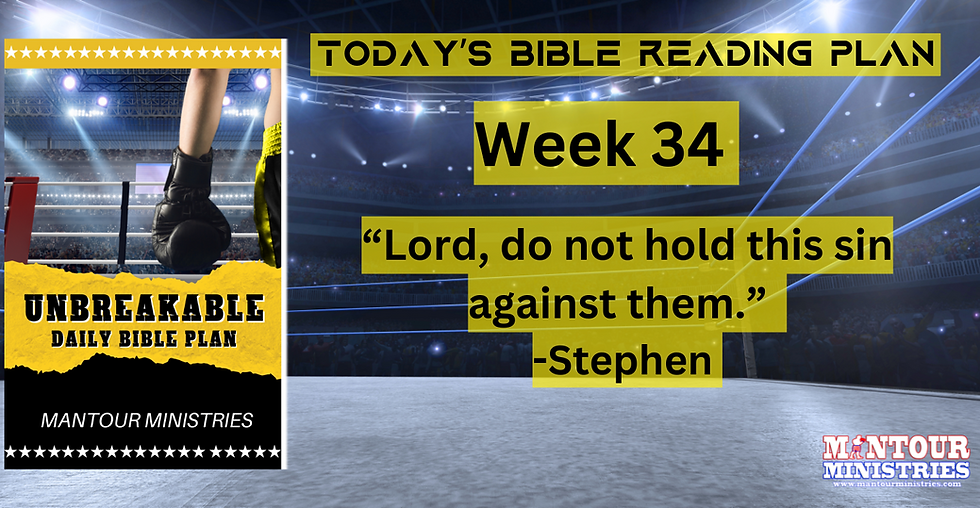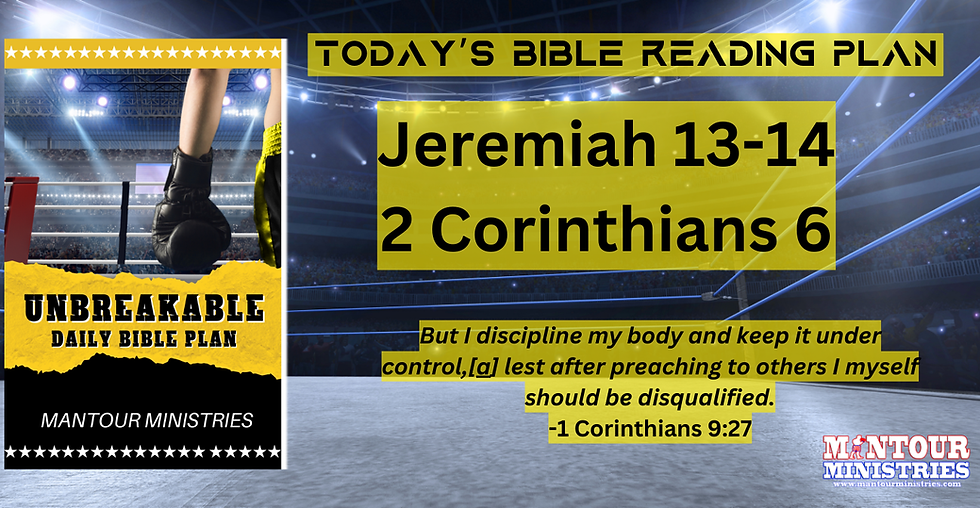August 23 Bible Reading Plan
- Jamie Holden
- Aug 23, 2025
- 3 min read

“Lord, do not hold this sin against them.”
-Stephen
Forgiveness. It's always challenging.
Especially when you're being stoned to death just for preaching the Gospel like Stephen. And yet, as we look at Acts 7, we see that these were Stephen's final words in this situation.
Now when they heard these things they were enraged, and they ground their teeth at him.
But he, full of the Holy Spirit, gazed into heaven and saw the glory of God, and Jesus standing at the right hand of God.
And he said, “Behold, I see the heavens opened, and the Son of Man standing at the right hand of God.” But they cried out with a loud voice and stopped their ears and rushed together at him.
Then they cast him out of the city and stoned him. And the witnesses laid down their garments at the feet of a young man named Saul.
And as they were stoning Stephen, he called out, “Lord Jesus, receive my spirit.”
And falling to his knees he cried out with a loud voice, “Lord, do not hold this sin against them.”
And when he had said this, he fell asleep. (Acts 7:54-60, ESV)
In these verses, Stephen sets the example for forgiveness, which makes us an unbreakable men of God. Unforgiveness breaks us, when we forgive, the pain meant to destroy us loses its power over us, making us unbreakable.
But Jamie, you don't know what happened to me. I can't forgive.
Perhaps that's because you don't completely understand forgiveness. Here are some facts about forgiveness that might help.
1. Forgiveness heals you.
Imagine someone dumping garbage all over you. It wasn't your fault; they had no right to do it. However, now the choice rests with you—will you live covered in the garbage or shake off the trash, take a bath, and move on?
Straight truth: Forgiveness is how you shake off the garbage.
2. Forgiveness is not condoning the other person's behavior as acceptable or no big deal.
It isn't a get-out-of-jail-free card for people who aren't really sorry and don't want to change their lives.
When we realize that forgiveness isn't saying, "Oh, it's okay that you did this, or it's no big deal," we can put things into perspective and forgive.
3. Forgiveness doesn't mean you have to forget.
Realistically, you can't forget what happened. It's part of your story. Forgiveness will heal your heart and take away the pain when you remember. That's how I can write about my past or tell my story in a sermon because it doesn't hurt anymore. I can't forget the facts, but I no longer have to live trapped in the pain.
4. Forgiveness doesn't mean you don't bring it up again.
Talking about issues is the key to freedom. Talking is healthy. Suppressing hurts, and keeping secrets is unhealthy. God wants us to be healthy.
5. Forgiveness doesn't mean you have to put your heart on the line to be hurt by someone who is unrepentant and unchanged.
Just because God commands us to forgive does not mean that He wants us to allow people to abuse us, demean us, or diminish our dignity without establishing boundaries. That would be unwise. God wants His children to be wise.
Healthy boundaries are choices that you make to proceed in a safer, healthier, and more beneficial manner to live a peaceful life.
6. Forgiveness is not about the other person.
Forgiveness is a gift you give yourself. It's how you let the other person to God and move on with your life. It's how you go of the pain and free yourself to be an unbreakable man of God.
As I said before, unforgiveness breaks us. However, when we forgive, the pain meant to destroy us loses its power over us, making us unbreakable.
Stephen did it. Jesus did it. You can do it, too.




Comments